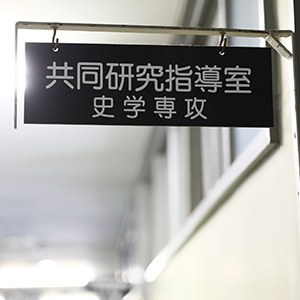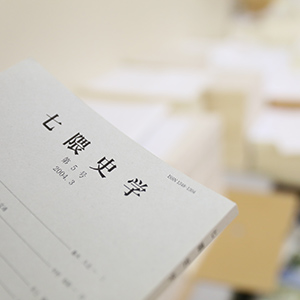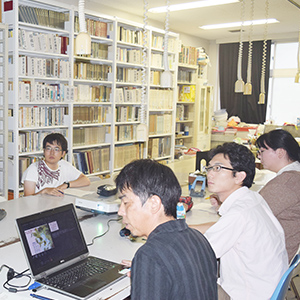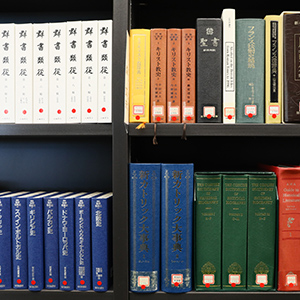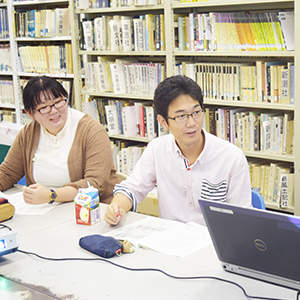Features of History Major
This major is divided into four specialized courses: Japanese History, Chinese History, Occidental History, and Archeology, each of which includes seminars, special lectures, reading of historical documents (master's program), and special studies and lecturers (doctoral program).
Our full-time faculty members are engaged in research in the following areas: Japanese History: “Medieval history and Early modern history from the perspectives of politics, economy and culture”, “Politics and economic history through the late Edo period and Meiji Restoration,” and “Society during the Showa war period and postwar period”; Chinese History: “History of the Tang and Song periods” and “Socio-economic history of the Ming and Qing periods”; Occidental History: “American history” and “Medieval and Early Modern European History”; Archeology: “Neolithic to medieval and early-modern period” and “East Asian archeology” and "Monetary history".
Each specialized course also offers classes conducted by visiting experts in various fields from ancient history to the present day.
Curriculum
Master's Program
Please click on the tab of the field you want to view.
- Japanese History Specialized Course
- Occidental History Specialized Course
- Chinese History Specialized Course
- Archeology Specialized Course
| Categories | Subjects | Number of Credits |
|---|---|---|
| Japanese History Specialized Course | Graduate Seminar in Japanese History | 4 or 8 credits |
| Special Lecture in Japanese History I a | 2 credits | |
| Special Lecture in Japanese History I b | 2 credits | |
| Special Lecture in Japanese History I c | 2 credits | |
| Special Lecture in Japanese History I d | 2 credits | |
| Special Lecture in Japanese History II a | 2 credits | |
| Special Lecture in Japanese History II b | 2 credits | |
| Special Lecture in Japanese History II c | 2 credits | |
| Special Lecture in Japanese History II d | 2 credits | |
| Special Lecture in Japanese History III a | 2 credits | |
| Special Lecture in Japanese History III b | 2 credits | |
| Special Lecture in Japanese History III c | 2 credits | |
| Special Lecture in Japanese History III d | 2 credits | |
| Special Lecture in Japanese History IV a | 2 credits | |
| Special Lecture in Japanese History IV b | 2 credits | |
| Special Lecture in Japanese History IV c | 2 credits | |
| Special Lecture in Japanese History IV d | 2 credits | |
| Special Lecture in Japanese History V a | 2 credits | |
| Special Lecture in Japanese History V b | 2 credits | |
| Special Lecture in Japanese History V c | 2 credits | |
| Special Lecture in Japanese History Ⅴ d | 2 credits | |
| Special Lecture in Japanese History Ⅵ a | 2 credits | |
| Special Lecture in Japanese History Ⅵ b | 2 credits | |
| Special Lecture in Japanese History Ⅵ c | 2 credits | |
| Special Lecture in Japanese History Ⅵ d | 2 credits | |
| Reading of Japanese, Historical Documents A | 4 credits | |
| Reading of Japanese, Historical Documents B | 4 credits |
| Categories | Subjects | Number of Credits |
|---|---|---|
| Occidental History Specialized Course | Graduate Seminar in Occidental History | 4 or 8 credits |
| Special Lecture in Occidental History I a | 2 credits | |
| Special Lecture in Occidental History I b | 2 credits | |
| Special Lecture in Occidental History I c | 2 credits | |
| Special Lecture in Occidental History I d | 2 credits | |
| Special Lecture in Occidental History II a | 2 credits | |
| Special Lecture in Occidental History II b | 2 credits | |
| Special Lecture in Occidental History II c | 2 credits | |
| Special Lecture in Occidental History II d | 2 credits | |
| Special Lecture in Occidental History III a | 2 credits | |
| Special Lecture in Occidental History III b | 2 credits | |
| Special Lecture in Occidental History III c | 2 credits | |
| Special Lecture in Occidental History III d | 2 credits | |
| Special Lecture in Occidental History IV a | 2 credits | |
| Special Lecture in Occidental History IV b | 2 credits | |
| Special Lecture in Occidental History IV c | 2 credits | |
| Special Lecture in Occidental History IV d | 2 credits | |
| Special Lecture in Occidental History Ⅴ a | 2 credits | |
| Special Lecture in Occidental History Ⅴ b | 2 credits | |
| Special Lecture in Occidental History Ⅴ c | 2 credits | |
| Special Lecture in Occidental History Ⅴ d | 2 credits | |
| Reading of Occidental, Historical Documents A | 4 credits | |
| Reading of Occidental, Historical Documents B | 4 credits |
| Categories | Subjects | Number of Credits |
|---|---|---|
| Chinese History Specialized Course | Graduate Seminar in Chinese History | 4 or 8 credits |
| Special Lecture in Chinese History I a | 2 credits | |
| Special Lecture in Chinese History I b | 2 credits | |
| Special Lecture in Chinese History I c | 2 credits | |
| Special Lecture in Chinese History I d | 2 credits | |
| Special Lecture in Chinese History II a | 2 credits | |
| Special Lecture in Chinese History II b | 2 credits | |
| Special Lecture in Chinese History II c | 2 credits | |
| Special Lecture in Chinese History II d | 2 credits | |
| Special Lecture in Chinese History III a | 2 credits | |
| Special Lecture in Chinese History III b | 2 credits | |
| Special Lecture in Chinese History III c | 2 credits | |
| Special Lecture in Chinese History III d | 2 credits | |
| Reading of Chinese, Historical Documents A | 4 credits | |
| Reading of Chinese, Historical Documents B | 4 credits |
| Categories | Subjects | Number of Credits |
|---|---|---|
| Archeology Specialized Course | Graduate Seminar in Japanese Archeology | 4 or 8 credits |
| Special Lecture in Japanese Archeology I a | 2 credits | |
| Special Lecture in Japanese Archeology I b | 2 credits | |
| Special Lecture in Japanese Archeology I c | 2 credits | |
| Special Lecture in Japanese Archeology I d | 2 credits | |
| Special Lecture in Japanese Archeology II a | 2 credits | |
| Special Lecture in Japanese Archeology II b | 2 credits | |
| Special Lecture in Japanese Archeology II c | 2 credits | |
| Special Lecture in Japanese Archeology II d | 2 credits | |
| Special Lecture in Japanese Archeology III a | 2 credits | |
| Special Lecture in Japanese Archeology III b | 2 credits | |
| Special Lecture in Japanese Archeology III c | 2 credits | |
| Special Lecture in Japanese Archeology III d | 2 credits | |
| Special Lecture in Japanese Archeology IV a | 2 credits | |
| Special Lecture in Japanese Archeology IV b | 2 credits | |
| Special Lecture in Japanese Archeology IV c | 2 credits | |
| Special Lecture in Japanese Archeology IV d | 2 credits | |
| Method Archeology A | 4 credits | |
| Method Archeology B | 4 credits |
Doctoral Program
Please click on the tab of the field you want to view.
- Japanese History Specialized Course
- Western History Specialized Course
- Oriental History Specialized Course
- Archeology Specialized Course
| Categories | Subjects | Number of Credits |
|---|---|---|
| Japanese History Specialized Course | Special Studies on Japanese History I | 12 |
| Special Studies on Japanese History II | 12 | |
| Special Studies on Japanese History III | 12 | |
| Special Lecture on Japanese History I | 4 credits | |
| Special Lecture on Japanese History II | 4 credits | |
| Special Lecture on Japanese History III | 4 credits |
| Categories | Subjects | Number of Credits |
|---|---|---|
| Western History Specialized Course | Special Studies on Occidental History I | 12 |
| Special Studies on Occidental History II | 12 | |
| Special Lecture on Occidental History I | 4 credits | |
| Special Lecture on Occidental History II | 4 credits |
| Categories | Subjects | Number of Credits |
|---|---|---|
| Oriental History Specialized Course | Special Studies on Chinese History I | 12 |
| Special Studies on Chinese History II | 12 | |
| Special Lecture on Chinese History I | 4 credits | |
| Special Lecture on Chinese History II | 4 credits |
| Categories | Subjects | Number of Credits |
|---|---|---|
| Archeology Specialized Course | Special Studies on Japanese Archeology I | 12 |
| Special Studies on Japanese Archeology II | 12 | |
| Special Lecture on Japanese Archeology I | 4 credits | |
| Special Lecture on Japanese Archeology II | 4 credits |
Process of Acquiring a Master’s Degree or PhD
Master's Program
Requirements for Applying for a Master’s Degree
- Period of Enrollment
You must be enrolled in the master’s program for more than 2 years. - Credit Requirements
A total of 32 credits or more must be obtained for a predetermined subject.
Process to Apply for a Degree
-
Framework of Research Guidance
Students will receive guidance on setting a research theme and creating a research plan in their field of specialization from a supervisor determined at the time of enrollment. Graduate students will conduct a series of research activities, and acquire professional competence through presentations of research results at research debriefings and conferences. -
First year
April: Attend orientation sessions for the entire major and for each specialized course. Prepare a "research plan" while receiving guidance on thesis writing from the supervisor.
From May to March of the following year: Make an interim report in the "Exercises" assigned by the supervisor, and report on the progress of the research. Receive guidance and advice from faculty staff and graduate students, identify problems in the course of the research, and discuss solutions. In addition, at the discretion of each department, an interim debriefing session will be held as appropriate to report on the progress of the research and to receive extensive guidance and advice from the supervisor, other faculty staff, and graduate students. -
Second year
April: Review the research plan as necessary based on the progress of the first year.
From April to January of the following year: Continue to report the research results in "Exercises" and learn the process of compiling research results. When research results above a certain level are obtained, they will be presented at conferences and submitted for publication to receive wide internal and external evaluation.
From October to January of the following year: Submit the master's thesis proposal and receive guidance from the chief and vice-chief examiners to be determined thereafter.
From January to February: Submit the master's thesis. Take the oral examination (the final examination) of the master's thesis and answer questions from the chief and vice-chief examiners. Present the research results at the master's thesis presentation and answer questions from faculty members and students.
Doctoral Program
Requirements for Applying for a PhD
- Period of Enrollment
Those who have been enrolled in the doctoral program for more than 3 years, have earned the required credits, and have received the necessary research guidance.
Process to Apply for a Degree
- Framework of Research Guidance
Students will receive guidance on research activities in their field of specialization from a supervisor determined at the time of enrollment. Graduate students will conduct a series of research activities, report the results at academic conferences, submit papers to specialized journals, and experience rigorous peer review, thereby acquiring the ability to carry out research activities independently. -
First year
April: Discuss the research plan with the supervisor and formulate the framework for preparing the doctoral thesis.
From May to March of the following year: Accumulate research results based on in-depth discussions with the supervisor. Report on the progress of their research in the "Special Research" directed by the supervisor. Receive evaluations, advice and guidance from the supervisor, identify problems in the course of the research, and discuss solutions. When a coherent set of results is obtained, the project will be actively presented at conferences, etc., and will be widely evaluated both inside and outside the university. -
Second year
April: Review the research plan as necessary based on the progress of the first-year research.
From April to March of the following year: In preparation for the submission of the thesis, the progress of the research will be continuously monitored in "Special Research" and in-depth discussions with the supervisor will be fed back to the research content. Students will continue to actively present research results at conferences, etc., to receive wide internal and external evaluations, and submit papers to specialized academic journals for peer review experience. -
Third year
From April to October: Continue to present research results at conferences and in specialized academic journals as the research progresses, and receive wide internal and external evaluations. Prepare a thesis summarizing research achievements and results to date. Submit the thesis and request for dissertation review after approval from the supervisor. When preparing the thesis, students will receive specific guidance on content and structure from their supervisor.
From November to January: Presentation (public hearing) of doctoral degree application thesis (final examination) will be held. Summarize the research results and answer questions from the chief and vice-chief examiners and attendees.
See other majors
- Japanese Language and Literature Master's Program and Doctoral Program
- English Language and Literature Master's Program and Doctoral Program
- German Language and Literature Master's Program and Doctoral Program
- French Language and Literature Master's Program and Doctoral Program
- Socio-Cultural Studies Master’s Program
- Education and Clinical Psychology Master's Program and Doctoral Program

